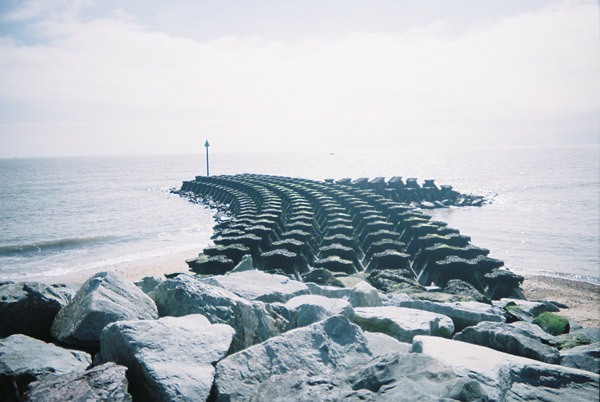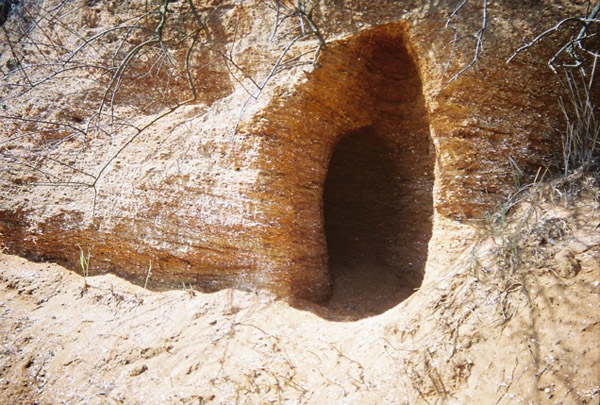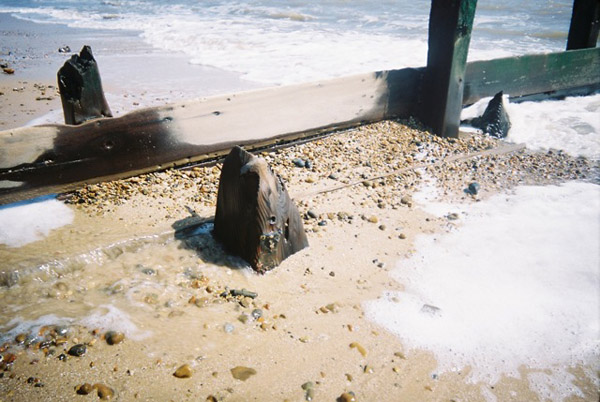In a large blacked-out room at the Showroom Gallery, sound artists and theorists Mark Fisher and Justin Barton of The Otolith Group have installed their haunting audio-essay On Vanishing Land. On one level it’s a simple set up. A projector shows us a series of snapshots from Felixstowe Container Port; deserted beaches to derelict pillboxes fading into one another. Images of a journey Fisher and Barton took in 2005 along the Suffolk coastline. On another level the main feature, a forty-five minute audio essay, is far from straightforward in its mix of storytelling and non-fiction. Narrated in the third person by Justin Barton, along with a series of interviews that include archaeologist Angus Wainwright (National Trust) and Editor Dan Fox (Frieze), there are ideas of hauntology, sonic theory, hidden history, and capitalist realism. It’s a collaborative effort exploring the Eerie that reinterprets M.R. James’ Oh Whistle, And I’ll Come To You, My Lad (1904) and Brian Eno’s airport solstice like tracks from seminal album On Land (1982), with contributions from Ultravox’s renowned John Foxx and upcoming talent Gazelle Twin and experimental Farmers of Vega.
An evolution of London Under London, the first Barton and Fisher’s first collaboration, On Vanishing Land emerges as a squeal, pushing key audio essay elements further than before. Vocal pieces are re-sampled and abstracted onto the same plane as music, not simply played sequentially one after the other. Words are transformed and music breaks free of the constraints of a backing track, menacingly taking us into an unknown where interiority and exteriority surface as dualistic concepts. It invades our sense of the world around us, our fear of what lies beyond the vanishing point, a state of detachment on the point of deliriousness.
aqnb spoke to Justin Barton on his role in the project, whose interests include the concept of maps as a means for escaping the everyday of dead reality, and for whom art is visual means of breaking free of the mind forged manacles of convention.

aqnb: Why separate the audio from the visual?
Justin Barton: Well, despite our unbelievable love of music, human begins are excessively visual and there is a legacy –which is obviously bolstered by film and TV –that wants everybody to fixate on the screen, and allow what they’re hearing to be commentary for what’s on the screen. There’s that hole in their attention and the music becomes secondary. Obviously, often music can do a good job out of those situations but with this it wasn’t the case. Instead, we wanted people to use music as the basis.
aqnb: There are a lot of collaborators who worked on the piece. What was the brief you gave them?
JB: We wanted people to have a sense of what we were doing so Mark set up a website called On Vanishing Land, which gave a few images and two pieces of text, and all the people who contributed music had access to that. Some people we knew really well and we could just tell them anyway. In a way, we wanted people to know that we wanted music with an eerie quality that was also about landscape.
aqnb: How was the route originally planned?
JB: After London Under London we came up with an idea for a new project, which involved an interest in ruined spaces, derelict spaces, which were not gothic ruins but were more like Second World War ruins, for instance. In a way, we were looking at a sort of sunlit dereliction, an empty space that is not functional anymore and there is a sense it’s also not part of reality any longer, in the sense that it has no function with reality and sets you dreaming. If a child goes into a derelict space, it immediately starts dreaming up things and playing around in it.
But we went to Suffolk because Mark had been there on holiday as a child – the Suffolk coast has lots of World War II ruins, so we knew we were going somewhere that had what we were looking for and we decided to research it. What ended up happening was that walk that we did ended up being in part a basis for The Corridor, a novel I’ve just finished writing, but then also fundamentally became the basis for On Vanishing Land. We knew all along we had not only WW2 ruins and Martello Towers, we knew we had M.R. James as a key element in that space, where he wrote most of his ghost stories but we also had Brian Eno, who came from Woodbridge. When you start to see a space, not in terms of concrete but hauntologically, you see you have these sorts of figures, and we began to see that we had a seed crystal we could work it all up from. And from that it eventually managed to grow up and break free.

aqnb: Was going to the countryside an escape from London Under London?
JB: I think one of the best moments of Gilles Deleuze and Félix Guattari’s A Thousand Plateaus’ is when they say: ‘in short we think you can not speak sufficiently in the name of an outside.’ Now London Under London was already thinking in terms of the outside but the outside is the outside of ordinary reality and the countryside is merely one outside. And if that’s what you’ve got in mind then there never is an escape to the countryside because there’s always the problem of getting outside of where you are – it doesn’t matter where you are in the countryside. The outside is already in London Under London, it was never just about the city and what’s at steak in On Vanishing Land is just the same as what’s at stake in London Under London.
aqnb: Is the fact that it’s on the coast significant? It seems like the coast itself, as a natural force and a plain between nations, serves as a barrier, a representation of interior and exterior?
JB: I mean, obviously it’s all constructed around one axis, which is incursions from the outside and one of those is the sea taking the land away but it’s the crudest of them. Also, invasions are there but not particularly important. Then there is the idea that capitalism floods into our ports, as the vast majority of our goods are shipped in to Felixstowe Container Port. And it’s worth bearing in mind, when thinking of exteriority, that capitalism came into the state from another world. The world of the state got defeated 250 years ago and the state is still now trying to cope with that fact, they have been for quite some time… but even that’s not really important in the end. Really, this is about being trapped in a locked down reality – that’s what is most important and that’s what we’re aiming at, in terms of saying radar becomes active in relation to the unknown.

aqnb: How did Brian Eno as a figure come to represent the themes you wanted to discuss?
JB: Well, I think Brian Eno’s best work may be On Land. In a way the key concept, well a good way of thinking about a take on hauntology, would be we’re almost always fundamentally haunted by the future, and it would seem if the more you look at the stacked up death world of the past, the more there are times when the future appears to be closer then when it is now. Broadly speaking, me and Martin are working with a way of thinking that between 1962 and 1982 the future was a lot closer than it is now, this is in an anomalous sense of the future here. And Brian Eno’s place in this is that he’s being critiqued. At some point he began going wrong, at some point in the 70s an Unfamiliar Wind was released, and there’s real talent there but the songs kind of faded away into an indulgent serene space around about 1977. It’s real dreaming but there’s something of the affectation. Then at the very end, on the cusp, at the point where everything is beginning to collapse, it collapses in so many different ways that it comes ‘round. It’s no English or Suffolk thing because he mixes recorded bird song from his trip to Ghana, but it’s that very real de-territorialisation, which gives it a slightly eerie quality. It’s the darkest of his ambient albums, darker than Music For Airports, which already has that serene quality to it.
aqnb: What is the concept of Eerie fundamentally about for you?
JB: I think the main thing conceptually with Eerie is the unknown. The concept of the Eerie, in a way, takes you out of a dark entrapment space, the Kantian world where there is nothing but the utterly unknowable. The Eerie is always this sense that there is something there that’s on the same scale as you and, in a sense, could be aware of you. If you are in the wilderness and something eerie happens, it would be the sense that maybe you were being watched. There’s something there but it’s not the normal. It could, for instance, be a human being that is just not an ordinary human being; it’s something unexpected, on a different level to what you’ve experienced before. I mean, Eerie relates to the idea of the unknown, which is knowable, the fundamentally known but neither the less unknowable. It’s kind of like Ariadne’s thread leading out of ordinary reality. Kant traps us in a world where everything is the world of known, which is unknowable. The Eerie gives you the Ariadne’s thread, which is leading out.**













